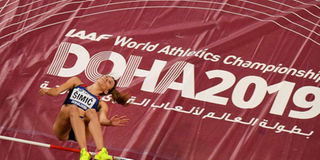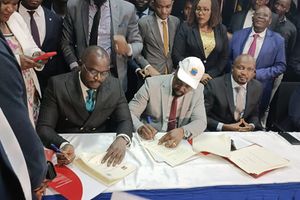Doha World Championships Notebook - Day One

Croatia's Ana Simic competes in the Women's High Jump heats at the 2019 IAAF World Athletics Championships at the Khalifa International stadium in Doha on September 27, 2019. PHOTO | ANTONIN THUILLIER |
What you need to know:
- The World Athletics Championships is the single most important competition organised by the International Federation of Athletics Federations (IAAF)
- Most Qataris I have met since I arrived here remember Kenya’s all-time leading goal scorer Dennis ‘the Menace’ Oliech.
World Championships Qatar’s warm-up for 2022 Fifa World Cup
*****
If world football governing body Fifa wants to judge Qatar’s readiness to host the 2022 Fifa World Cup, it need not look further than the success (or lack of it) with which the oil-rich nation hosts World Championships in athletics.
The World Athletics Championships is the single most important competition organised by the International Federation of Athletics Federations (IAAF) and winners from the biennial competition get to be called world champions for at least two years and so Qatar will pull out all stops to host a successful championship, knowing that Fifa honchos in Zurich are watching with more than casual attention.
To begin with, the Khalifa Stadium around which the World Athletics Championships is centered will also host, among others, the opening and closing matches of the 2022 Fifa World Cup. World Athletics Championship will test Doha’s transport infrastructure, the hospitality sector and the enthusiasm with which the locals identify with and support sports.
Qataris are united in adversity, stronger after Gulf states blockade
*****
Last year, Qatar’s neighbours and influential countries in the Gulf enforced air, land and sea blockade on Qatar.
The United Arab Emirates, Saudi Arabia and Bahrain closed their borders with Qatar and cut off access with Qatar through sea and air over what they termed Qatar’s support for terrorism, and made it illegal to tune in to Qatari-owned Al Jazeera television network, including at airports, hotels and in their households.
The once-thriving cross-border trade with Saudi Arabia dried up and Qatar resorted to importing fresh fruits and vegetable by air while building its own capacity to grow food for herself.
The countries recalled their ambassadors from Doha, and Qatar retaliated in kind. But the blockade has created a siege mentality among Qataris who have rallied round their county like never before. Since I arrived in Doha, most Qataris I have met speak very high of their country and believe the blockade has made them stronger.
Most Qataris remember Kenyan striker Dennis ‘the Menace’ Oliech
******
Most Qataris I have met since I arrived here remember Kenya’s all-time leading goal scorer Dennis ‘the Menace’ Oliech.
The former Harambee Stars captain played for Qatar’s top-flight football league club Al Arabi before moving on to play for Nantes, Auxerre and Ajaccio in the French League.
His unquestionable talent, eye for goal and dazzling pace aside, Oliech endeared himself to many Kenyans when he turned down an offer for Bahraini citizenship at the peak of his career.
From Prince Hamad International Airport to Khalifa Stadium, most Qataris I have met remember Oliech as “the soft-spoken Kenyan who left for France.” Yesterday, I introduced myself as a Kenyan to a group of Qatari journalists at an eatery in Doha and the immediate question was: “How is Oliech doing?”
Without delving into the details of how badly Kenya treats her sporting heroes, my answer to that question has been brief: “Dennis the Menace is back home.”
Most of the time, my answer to that question has also been informed by the desire to have Qataris remain with good impression Oliech created in them, not an image of a sporting hero whose government has not even cared to name an overgrown village playground after him.





